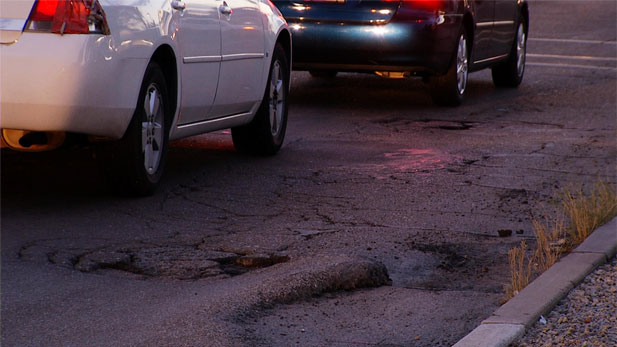
Listen:
Transportation funding is a struggle in Arizona, in part because the taxes that are supposed to go to roads are proving to be insufficient to meet all of the backlogged road work needs
For example, Pima County has more than 2,200 miles of roads, and this year the maintenance portion of the county’s transportation budget is less than $30 million– less than one tenth of the $300 million needed to bring all of the roads in the unincorporated area up to good or excellent condition.
The city of Tucson is in a similar situation, with the cost of needed roadwork far outpacing the amount of money available. This month the Arizona Town Hall organization held a meeting to draft possible solutions.
“In this somewhat declining and depressed economy, how do you fund this kind of work? People still drive, the roads are still failing, how do we fund it?” said Hal Ashton, chairman of The Ashton Company, a Tucson road construction company.
Political opposition to raising taxes sometimes clouds decision makers facing road funding issues, Ashton said.
“If you say 'no new taxes,' then if you need more money where does it come from?” he said.
Hesitancy to raise taxes is a common refrain among politicians, but Sen. Steve Farley, D-Tucson, said voters usually approve transportation tax increases, so politicians should, too. He used a neighboring state as an example.
"If you look at the Utah legislature, on March 15 they had a 24-cent a gallon gas tax. They voted to eliminate that and replace it with a 12 percent gas tax," he said. "The Utah legislature set a minimum and maximum so the tax would not fluctuate endlessly with the price of gasoline.
He said that's a model for Arizona.
“If you can do that in a very red state like Utah, there’s no reason you can’t be doing it here," he said.
But that's not even Farley's main point.
The state should raise its 18-cent-per-gallon gasoline tax, and then it should add new transportation taxes to make ends meet and keep up with present needs, he said.
“We can’t tie our future of transportation funding to a fuel source," Farley said. "We should make it fuel agnostic, I call it. It doesn’t matter what fuel you use, we need to figure out a way that the funding sources is not tied to the fuel."
The Arizona gasoline tax was set at 18-cents-per-gallon in 1990. The federal 18.4-cent-per-gallon gasoline tax hasn't changed since 1993. People aren't using as much fuel as they used to, Farley said.
"That means that we should be looking at things like potentially a vehicle miles traveled fee where you get charged for how many miles you’ve traveled," he said. "We may look at a different kind of VLT, vehicle license tax depending on the weight of the car a rough estimate of how much damage it does to the pavement. We could be looking at a whole lot of other sources.”
The people who attended the Arizona Town Hall are recommending the state create a commission to figure out how to pay for transportation in the state, Ashton said. Farley agreed.
“There shouldn’t be this fear of finding a sustainable funding source from our legislators because voters will back you up if you’re collecting something for a specific purpose that they see as valuable, and I think everybody sees transportation as valuable to our economy and to our everyday lives," Farley said.
AZPM's Metro Week will focus on roads, maintenance and funding Friday at 8:30 p.m. and Sunday at 10:30 a.m. on PBS 6.

By submitting your comments, you hereby give AZPM the right to post your comments and potentially use them in any other form of media operated by this institution.